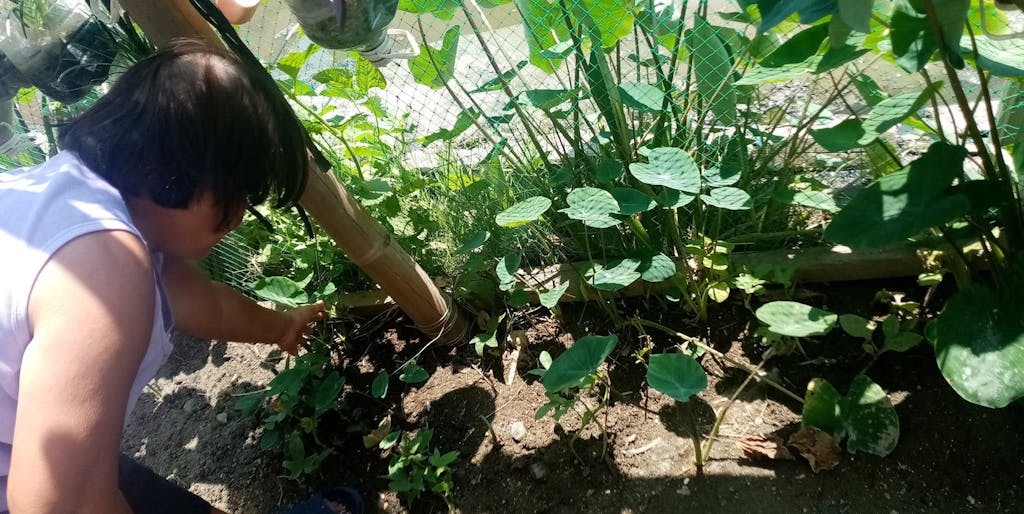When the president of the Philippines declared a coronavirus lockdown for metro Manila on March 16, 2020, it panicked many families Food for the Hungry (FH) works with. But an urban garden became a weapon against lost income and despair for one group of mothers, who call themselves the Rainbow Savings Group.
FH began work in Navotas, part of Manila’s urban sprawl, in 2017. Housing is substandard and even dangerous. Fires frequently burn down entire blocks (many of them caused by faulty electrical wiring). Parents work in day labor, many not knowing from one day to the next how much income they’ll bring in. It’s a bad place to be a child. And with the lockdown, families couldn’t earn money to feed their children.
The Rainbow Savings Group started meeting in 2017, aided by FH livelihoods officer Geraldine Mabaet. In the savings group, they learned about budgeting and saving, and could take out small loans. They also learn about health, hygiene, and nutrition so that their children grow up stronger and healthier.
A Recycled, Repurposed Coronavirus Response
The Rainbow women live in government housing on a reclaimed mangrove swamp. They had little room for planting, but they wanted to grow nutritious vegetables for their families. So FH helped them attend an urban gardening seminar and provided them with the soil to create planters. The woman created a community garden on a small square of ground, and on the walls of their housing unit. They continue the story in their own words below:
Lilibeth Dela Rosa, Rainbow Savings Group Treasurer
 “We planted vegetables in our residence in a small vacant lot. We used old pots, tin cans boxes, and any recyclable materials that we could find for our plants. Even though the space we have is limited, we continue to take care of it and use it for planting.”
“We planted vegetables in our residence in a small vacant lot. We used old pots, tin cans boxes, and any recyclable materials that we could find for our plants. Even though the space we have is limited, we continue to take care of it and use it for planting.”
“We have something to get food from, even if it is just camote [sweet potato] tops and plant sprouts. I have also seen the importance of backyard gardening, especially since the government announced a community quarantine.”
Savings Group Member Beverly Sasabo
 “Having plants lessens our expenses. We can put food on the table and feed our family with the vegetables that we planted. And we are sure that these are nutritious and safe. We also share some with our neighbors to help them with their expenses.
“Having plants lessens our expenses. We can put food on the table and feed our family with the vegetables that we planted. And we are sure that these are nutritious and safe. We also share some with our neighbors to help them with their expenses.
During this time of COVID-19, because we have plants in our backyard, we no longer go out to the market, to keep safe from the virus and to follow the quarantine protocol.
We have grown eggplant, bitter gourd, Chinese cabbage, mustard, and bottle gourd. It gives me joy seeing the fruit of our labor!”
Savings Group Member Carmen Alcazar

“Currently, we have plants like string beans and hyacinth beans, and we recently planted new vegetables. Backyard gardening is a big help to us, especially now that there is COVID-19. Whoever has something to harvest, we share it with one another, especially the plant sprouts because they grow easily. We don’t buy those foods from the market anymore.”
Philippines Coronavirus Response Spells Opportunities
FH staff like Geraldine are finding new ways to interact with the people they worked with every day before the lockdown. Modern technology is helping immensely. For example, Geraldine obtained the quotes and photos for this story by talking with the savings group via cellphone. All over the world, FH staff are similarly helping community leaders solve problems by phone. No water in the community for handwashing? Let’s see what we can do by calling the municipal government to get some water trucked in. Rumors flying around the community about coronavirus symptoms? Let’s spread accurate health and hygiene information using WHO and UNICEF graphics by cellphone.
Both FH staff and the people they work with daily are finding ways to tear down coronavirus barriers.
Rainbow Savings Group treasurer Lilibeth Dela Rosa is a mother of two, and earns money as a manicurist and dressmaker. Her husband is a freelance mechanic. Lilibeth wanted money to buy a gas stove, but work is hard to come by when everyone is locked down. So she began sewing face masks with leftover cloth scraps from previous dressmaking jobs. She averages seven masks with four hours of sewing. “The 175 pesos (about US $3.50) that I’m earning every day is already a big help for my family, especially since my husband has no work because of COVID-19,” says Lilibeth.

When you give to FH’s COVID-19 efforts, you’ll be helping many communities like the one in Navotas, Philippines where mothers are doing their very best to help their families. Please continue to help FH bring hope to parents worldwide in these difficult times.
We also wish to thank FH Philippines livelihood officer Juliet Polvorosa for helping translate the quotes in this story. Coronavirus is bringing out new talents in so many these days.
You may also enjoy these blog posts:
Guatemala Response: Love in the Time of…Coronavirus?


